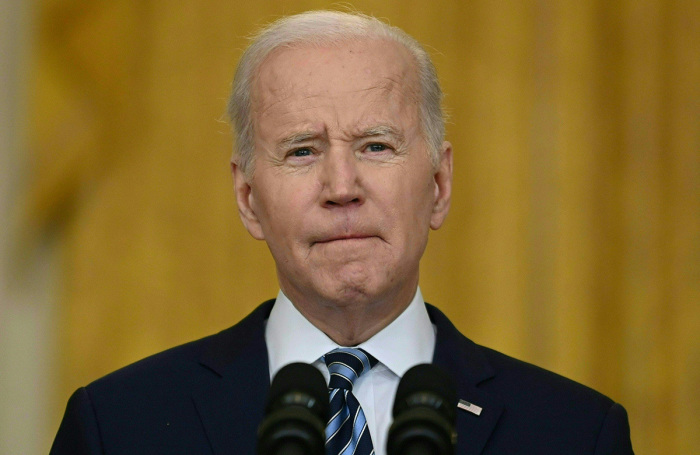Biden vows to hurt Putin's long-term ambitions with new sanctions: 'Freedom will prevail'
US 'forces are not and will not be engaged in the conflict with Russia and Ukraine'

President Joe Biden addressed the nation Thursday as Russia’s invasion of Ukraine intensifies, vowing to enact additional sanctions to hurt the Russian economy and President Vladimir Putin’s “long-term strategic ambitions.” Biden assured that “freedom will prevail.”
Biden spoke at a press conference in the East Room, calling the Russian military’s attacks that began Thursday targeting Ukrainian military assets across several cities a “brutal assault on the people of Ukraine without provocation, without justification, without necessity.”
Lamenting the “pre-meditated attack,” Biden asserted that “Vladimir Putin has been planning this for months.”
“This is a dangerous moment for all of Europe, for the freedom around the world,” he contended.
While the 79-year-old president spent much of his speech discussing the peril of the situation, he remained optimistic about the future.
“In the contest between democracy and autocracy, between sovereignty and subjugation, make no mistake. Freedom will prevail,” he said.
Biden insisted that all available diplomatic options have been exhausted before indicating that he had authorized “additional strong sanctions and new limitations on what can be exported to Russia.”
He maintained that the additional sanctions would “impose severe costs on the Russian economy, both immediately and over time.”
“We have purposefully designed these sanctions to maximize the long-term impact on Russia and to minimize the impact on the United States and our allies,” he said.
Biden touted a coalition of partners, including 27 members of the European Union, Great Britain, Canada, Japan, Australia, New Zealand and others.
Biden had spoken with leaders of the G7, a coalition of the world’s largest democracies, earlier in the day. He reported that they were in “full and total agreement” in determining that “we will limit Russia’s ability to do business in dollars, euros, pounds and yen to be part of the global economy.”
“We’re going to stop the ability of them to finance and grow … the Russian military,” he said. “We’re going to impair their ability to compete in [a] high-tech 21st-century economy.”
He cited the efforts of existing sanctions on the Russian economy and the strength of Russian currency as evidence that the approach would work.
The new sanctions will expand to four additional banks in Russia, meaning “every asset they have in America will be frozen.” They will also apply to members of “Russian elites” who have “personally gained from the Kremlin’s policies.”
“Between our actions and those of our allies and partners, we estimate that we’ll cut off more than half of Russia’s high-tech imports,” Biden predicted. “It will be a major hit to Putin’s long-term strategic ambitions.”
Biden stated that NATO, a group of nations formed during the Cold War to counter the Soviet Union, will convene a summit Friday. The summit will “bring together the leaders of 30 allied nations and close partners to affirm our solidarity and to map out the next steps we will take to further strengthen all aspects of our NATO alliance.”
The president vowed that U.S. “forces are not and will not be engaged in the conflict with Russia and Ukraine" and acknowledged the presence of U.S. troops in Europe “to defend our NATO allies and to reassure those allies in the east.”
Addressing the potential impact of heightened tensions with Russia on the price of gasoline in the U.S., Biden said that his administration was using “every tool at its disposal to protect American families and businesses from rising prices at the gas pump.”
Shortly after Biden spoke, reports surfaced that Russian forces seized the Chernobyl Nuclear Plant in Northern Ukraine.
Biden insisted that “this aggression cannot go unanswered” because “America stands up to bullies, we stand up for freedom.”
“This is who we are,” he said.
Biden detailed a conversation he had with Ukrainian President Volodymyr Zelensky. The president assured support for the Ukrainian people and vowed to provide “humanitarian relief” to the Eastern European country.
In response to a question from a reporter, Biden declared that he has “no plans to talk to Putin.”
He told another reporter that “[t]he notion that this is going to last for a long time is highly unlikely as long as we continue to stay resolved in imposing the sanctions we’re going to impose on Russia.”
Biden pushed back on the idea that sanctions would not change Putin’s mind about taking further action in Ukraine because sanctions have failed to deter him thus far.
He concluded that imposing the sanctions as opposed to simply threatening sanctions will “weaken” Russia so that Putin will “have to make a very, very difficult choice as to whether to continue to move toward being a second-rate power or, in fact, respond.”
In addition to reaction from global political leaders, religious groups have also condemned Russia’s aggression against Ukraine.
The Ukrainian Council of Churches and Religious Organizations released a statement Thursday expressing disappointment that “the efforts to prevent the outbreak of war by many people around the world, including our Council, have not been successful.”
“The truth and the international community are on the Ukrainian side,” the statement reads. “We believe that good will prevail with God’s help. We support the Armed Forces of Ukraine, and all our defenders, we bless them in their defense of Ukraine from the aggressor, and offer our prayers for them.”
A poll from the Associated Press, released Wednesday, reveals that Americans do not want the United States to play a major role in the Ukraine-Russia conflict. Just 26% of respondents want the U.S. to play a major role in the situation between Russia and Ukraine. Most Americans (52%) want the U.S. to play a minor role, while the remaining 22% think the U.S. should have no role in mediating the conflict.
Ryan Foley is a reporter for The Christian Post. He can be reached at: [email protected]




























